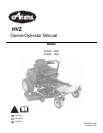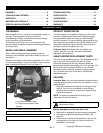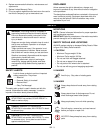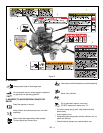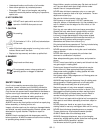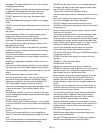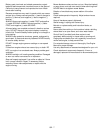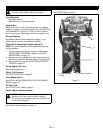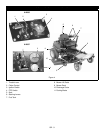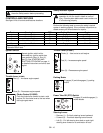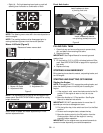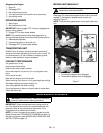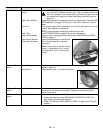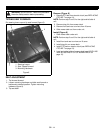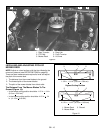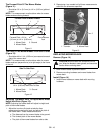GB - 6
Disengage PTO when attachment is not in use and when
crossing gravel surfaces.
DO NOT operate unit if safety interlock system is damaged
or disabled. Check safety interlock before each use.
ALWAYS remove key to prevent unauthorized use.
DO NOT operate at too fast a rate. Slow down before
turning.
Stop engine before removing grass catcher or unclogging
chute.
DO NOT mow on wet grass. Reduced traction could cause
sliding.
DO NOT try to stabilize the machine by putting your foot on
the ground.
Know the weight of loads. Limit loads to those you can
safely control and the unit can safely handle.
ALWAYS keep protective structures, guards and panels in
good repair, in place and securely fastened.
Do not operate without either entire grass catcher or the
discharge guard in place.
DO NOT operate in reverse unless absolutely necessary.
ALWAYS look down and behind before and while backing;
especially for children.
Follow the manufacturer’s recommendations for wheel
weights or counterweights to improve stability when using
attachments.
NEVER carry passengers–especially children–even with
blades off.
Use extra care when approaching blind corners or objects
that may obscure vision of hidden obstacles and children.
If you cannot back up a slope or you feel uneasy on it, do not
mow it.
Mow up and down slopes, not across them.
Use slow speed on any slope. Tires may lose traction on
slopes even though the brakes are functioning properly.
Keep all movements on the slope slow and gradual. DO
NOT make sudden changes in speed or direction.
Use extra care while operating machines with grass catcher
or other attachments. They can affect stability of the
machine.
Avoid starting, stopping, or turning on a slope. If tires lose
traction, disengage the blades and proceed slowly straight
down the slope.
DO NOT operate on slopes over 10°.
DO NOT park on slopes unless necessary. If unit is parked
on a slope, ALWAYS chock or block wheels and set parking
brake.
DO NOT disengage or bypass transmission and coast
downhill.
Tow only with a machine that has a hitch designed for
towing. Do not attach towed equipment except at the hitch
point.
Follow the manufacturer’s recommendations for weight
limits for towed equipment and towing on slopes.
NEVER allow children or others in or on towed equipment.
On slopes, the weight of the towed equipment may cause
loss of traction and loss of control.
Travel slowly and allow extra distance to stop.
Use extra care when loading or unloading unit onto trailer or
truck.
Secure unit chassis to transport vehicle. NEVER secure
from rods or linkages that could be damaged.
DO NOT transport machine while engine is running.
ALWAYS turn off power to attachment and shut off fuel when
transporting unit.
Keep unit free of grass clippings, leaves, and other debris.
Clean up oil or fuel spills.
This product is equipped with an internal combustion type
engine. DO NOT use unit on or near any unimproved,
forest-covered or brush covered land unless exhaust system
is equipped with a spark arrester meeting applicable local,
state or federal laws. A spark arrester, if it is used, must be
maintained in effective working order by operator.
Fuel is highly flammable and its vapors are explosive.
Handle with care. Use an approved fuel container.
NO smoking, NO sparks, NO flames. ALWAYS allow engine
to cool before servicing.
NEVER fill fuel tank when engine is running or hot from
operation.
NEVER fill or drain fuel tank indoors.
NEVER overfill fuel tank.
Replace fuel cap securely and clean up spilled fuel.
NEVER fill containers inside a vehicle or on a truck or trailer
bed with a plastic liner. Always place containers on the
ground away from your vehicle before filling.
When practical, remove gas-powered equipment from the
truck or trailer and refuel it on the ground. If this is not
possible, then refuel such equipment on a trailer with a
portable container, rather than from a gasoline dispenser
nozzle.
Keep the nozzle in contact with the rim of the fuel tank or
container opening at all times until fueling is complete. Do
not use a nozzle lock-open device.
If fuel is spilled on clothing, change clothing immediately.
Avoid Electric Shock. Objects contacting both battery
terminals at the same time may result in injury and unit
damage. DO NOT reverse battery connections.
Explosive Gases from battery can cause death or serious
injury. Poisonous battery fluid contains sulfuric acid and its
contact with skin, eyes or clothing can cause severe
chemical burns.
NO flames, NO sparks, NO smoking near battery.
ALWAYS wear safety glasses and protective gear near
battery. Use insulated tools.
DO NOT TIP battery beyond a 45° angle in any direction.
ALWAYS keep batteries out of reach of children.



